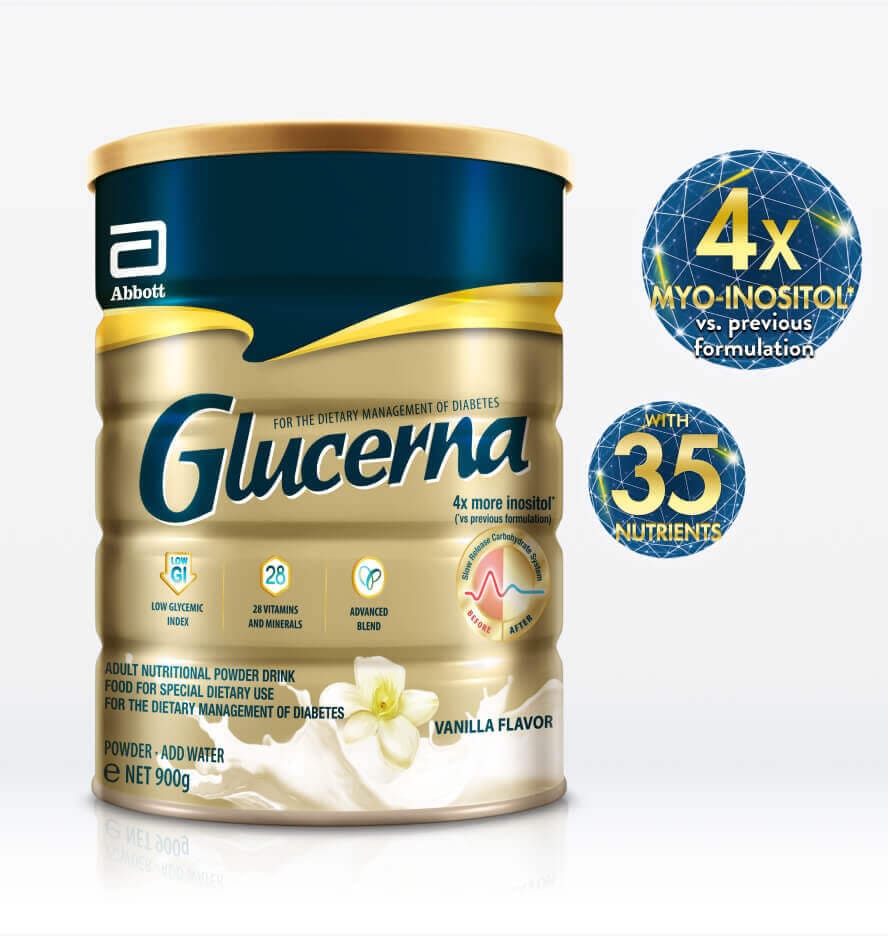Glucerna Vanilla Flavor
- Title
- Glucerna® Vanilla Flavor
- Detail Page Path
1. Consume a well-balanced diet rich in calcium and vitamin D.
A diet rich in calcium and vitamin D is important for building strong and healthy bones. Calcium plays many critical roles in your body, and enough intake of calcium is required to build strong bones. Vitamin D is also essential to support strong bones, as it is needed to absorb calcium. Eating a variety of foods and adding nutrition supplements to your diet can help you attain your daily calcium and vitamin D requirements3.
Good sources of calcium include dairy foods (milk, yogurt, cheese), fish with edible bones (sardines, anchovies), tofu made with calcium salts, lentils, green leafy vegetables, and calcium-rich food such as bread, biscuits, and soybean milk. The recommended daily allowance set by the Health Promotion Board is between 800 mg to 1000 mg for adults4.
Food sources of vitamin D include eggs, liver, oily fish (salmon, sardine, mackerel), and fortified food products such as selected milk brands, soymilk, yogurt, orange juice, ready-to-eat cereals, and margarine5. Enough sun exposure also helps in the production of vitamin D3. The recommended daily allowance set by the US Institute of Medicine, Food and Nutrition Board is between 15 mcg to 20 mcg for adults6.
2. Engage in regular exercise
Regular exercise is important for people with diabetes as it helps improve insulin sensitivity, which may help lower blood glucose levels. Additionally, it can also benefit you by helping prevent bone loss, enhancing balance and flexibility, and reducing the likelihood of falling. Ideal exercises for your bones are weight-bearing (walking, stair climbing, dancing) and resistance exercises (lifting weights)7.
3. Adopt a healthier lifestyle5
Removing unhealthy habits like smoking and alcohol consumption from your lifestyle can benefit your bones. Studies found that people who smoke may absorb less calcium from their diets, while heavy drinkers are more prone to bone loss and fracture because of poor nutrition and can also suffer an increased risk of falling.
Consult your healthcare professionals on how calcium and Vitamin D supplements may benefit you with your diabetes management plan!
1 Diabetes and Fractures — An overshadowed association. Curr Opin Endocrinol Diabetes Obes. 2009 Dec; 16(6): 435–445. doi: 10.1097/MED.0b013e328331c7eb
2 Moayeri, Ardeshir et al. “Fracture risk in patients with type 2 diabetes mellitus and possible risk factors: a systematic review and meta-analysis.” Therapeutics and clinical risk management vol. 13 455-468. 11 Apr. 2017, doi:10.2147/TCRM.S131945
3 HPB Health Hub- Daily Calcium Intake - For Greater Bone Strength Website: https://www.healthhub.sg/live-healthy/518/Calcium%20-%20For%20Greater%20Bone%20Strength
4 HPB Health Hub- Recommended Dietary Allowances. Website:https://www.healthhub.sg/live-healthy/192/recommended_dietary_allowances
5 Vitamin D: Recommended Dietary Allowances, Food Sources, and Side Effects https://www.healthxchange.sg/food-nutrition/supplements/vitamin-d-recommended-dietary-allowances-food-sources-side-effects
6 NIH Vitamin D- Fact Sheet for Health Professionals. Website:https://ods.od.nih.gov/factsheets/VitaminD-HealthProfessional/
7 NIH Osteoporosis and Related Bone Diseases National Resource Center - What People With Diabetes Need To Know About Osteoporosis Website: https://www.bones.nih.gov/health-info/bone/osteoporosis/conditions-behaviors/diabetes
Weight loss and having an active lifestyle can help you better understand how to control diabetes.
Discover how diabetes supplements can help you manage type 2 diabetes with a disciplined exercise regime and healthy diet.
Lowering your blood sugar can be as simple as making a few small dietary changes. Find out what you can do to help manage diabetes.
Glucerna® is the number 1 selling diabetes nutritional supplement in the world*. It contains 35 nutrients, slow-release carbohydrates and 4x more inositol vs previous formulation, that delivers a dual action for tight blood sugar control.
* Euromonitor International Limited; total global retail sales in 2023 for diabetic diet enhancer drinks that are not marketed as a meal replacement product. Euromonitor and Abbott calculation based in part on custom research conducted between October and November 2023 and Euromonitor Passport Consumer Health 2023 based on 2022 data.

PH.2025.67670.GLU.1
You are about to exit for another Abbott country or region specific website.
Please be aware that the website you have requested is intended for the residents of a particular country or region, as noted on that site. As a result, the site may contain information on pharmaceuticals, medical devices and other products or uses of those products that are not approved in other countries or regions.
The website you have requested also may not be optimized for your specific screen size.
Do you wish to continue and exit this website?